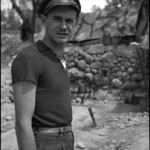“Chofers” As Seen By One Of Them by Easey Goldstein, Sargento

Isidore “Easey” Goldstein, Chief of “rolling” park, May 1938. The 15th International Brigade Photographic Unit Photograph Collection.
The Volunteer for Liberty, V.2, No. 33, October 6, 1938.
Among the unsung heroes of the Ebro action are the Brigade chauffeurs who bring the men food, munitions, and material. Because they work unostentatiously and efficiently, they have become accepted in a matter of fact way, as a cog in the war machine. And this, they know is to their credit. For if they were to break down, the effect would be almost catastrophic for the Brigade and the men who compose it.
The Chofers Work Fast:
One afternoon the order came for swift transportation of our boys to the front. Within ten minutes the first truck pulled out, loaded, and inside of an hour the entire Brigade had been transferred. Jack Lane, Tom Lloyd, Len Beurton, Tony Rizzo, Dave Davidson, Antrim Frank and Simon Leinoff, all drove through artillery fire repeatedly and brought the Brigade up.
The Chofers work Hard:
From the third to the eighth day after the Brigade had crossed the Ebro, six camions serviced us. The others could not get across. On the fourth day Juan Gilbert had his truck blown up almost in his face, just as he had helped carry out the last of the wounded he had driven to Ascó. On the fifth day Tony Rizzo’s drive shaft jammed and “froze.” Bill Allander, Antonio Munera, Jack Lane and George Garrow carried on during five days and nights of shell-fire, bombing, and strafing, with no more tan two or three hours sleep in twenty-four. Munitions and food to the front, wounded to the rea, over and over again.
The Chofers Work Understandingly:
Every chauffeur knew his value to the Brigade, and how necessary he was to the men. Shells or no shells, bombs, or no bombs, the food went up and the men got their bullets or grenades. During our Sierra Pandols action our water wagon remained at the front eighteen out of every twenty-four hours under the most trying conditions. “Our main difficulty,” explained Henry Plotnick the ayuadante on the tank who became twenty-one in Spain, “was to keep the whole Army of the Ebro from drinking our water.”
Working night and day also were mechanics Joe Zowadowski and John Pansik, and their helpers Sargento Francisco Bernabeau and Ramon Palanca. Hauling wrecks from the front, patching trucks, trouble shooting kept all four busier than at any time before in their lives. Freddy Pearson’s water tank was shrapneled; an hour and a half later it rolled out to bring water to the kitchen, eleven bright soldered spots on the tank. (Three empty bully-beef cans were used to stop up the holes.) Bombs and shells blew up five trucks and killed one chauffer, Johnny Koshak. Of the five camions, four are now rolling again and the motor of the fifth has since replaced one that was worn out. From the Fascists we took three trucks and a camionetta which placed our Transport a little ahead of where we started.
Working equally as fast and hard, the boys in the garage, mainly Spanish turned broken down blown up wrecks into good stable camions. “Bring us back the frame a few bolts and the motor” said Sargento Emanuel Arkus, Chief Mechanic, “and we’ll make a truck out of it.”
Dick Hanlen’s truck was smashed by two bombs that landed nearby, but within three days it returned in time to take a load across the river. The same with the Lincoln-Washington’s kitchen truck. The 59th’s truck and a captured camion. Body jobs, repaired by Cabo Vicente Banuls and Emilio Martinez were done on a mass-production scale, each body returning stronger than it had started out.
Lathe work –and there was plenty of it –helped make parts out of pipes and fittings. Smiling Cabo Antonio Torrent lived by his machine all day long, producing precision work. A former blacksmith’s helper before the war, he is now an expert lathe operator.
Pedro Riera, Vicente Soler, Salvador Serra, Juan Albero, Francisco Villar, and Francisco Molina, mechanic’s ayudantes spent many a sleepless night. The Ebro action gave them plenty of work, and a shortage of mechanics compelled them to do independent repairs.
This action proved that the Brigade Transport could “take it on the chin” and still have enough camions to serve the Brigade.














